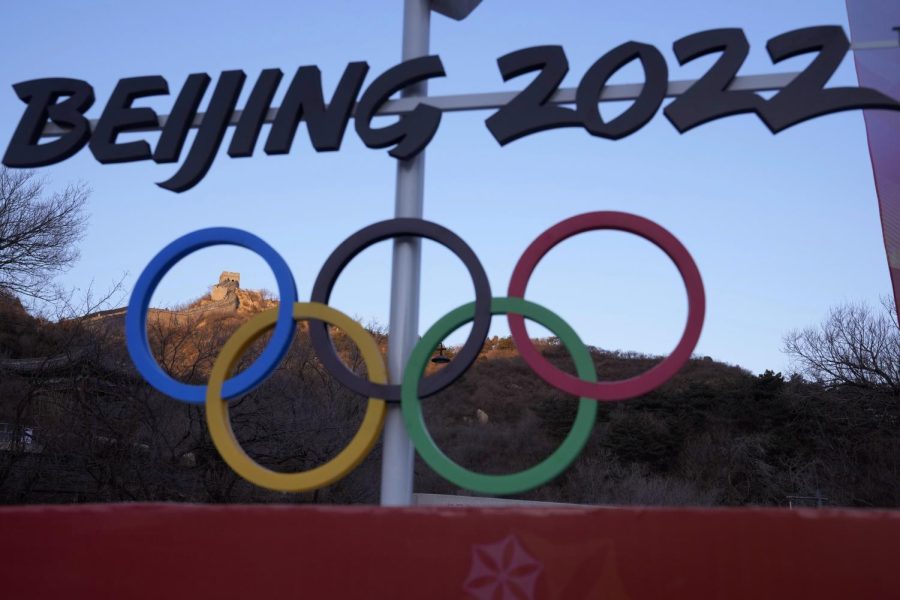Opinion: Case of Olympic Uyghur Torchbearer Illuminates Beijing’s Human Rights Controversy
On Feb. 2, 2022, two young torch-bearing athletes from Team China, swaddled in red and white jumpsuits, smiled and waved to audiences from the “Bird’s Nest” National Stadium in Beijing. On a stage illuminated by a giant blue LED snowflake, children stood in a heart formation around the two athletes. Thus commenced the Olympic games.
Despite a reduced audience size and limited mobility for athletes and the staff due to COVID-19, this age-old torch-lighting tradition survived. The lighting of the torch has “long been a centerpiece of Olympic opening ceremonies and marks the beginning of the Games,” according to NBC. It is “considered a great honor to be the last athlete to carry the flame.”
Bearing the great honor last Friday was Dinigeer Yilamujiang, a 20-year old Uyghur cross-country skier. Born in Xinjiang to a father who was a cross-country skier, this is the young woman’s first Olympics. Beside Yilamujiang stood Zhao Jiwen, a 21-year-old cross-country skier from China’s Han majority.
The choice of a Uyghur skier as the last torchbearer was cause for great controversy due to the oppression the Uyghur face under the Han majority in China, according to The Hill.
The Uyghur, with a population of 11 million, are a Turkish-speaking ethnic group from Xinjiang, in Northwest China. The detention of Uyghurs began in April 2017.
The Chinese government has since imprisoned more than two million Uyghur and, according to a Council on Foreign Relations report, “subjected those not detained to intense surveillance, religious restrictions, forced labor, and forced sterilizations” on the outskirts of Xinjiang.
“Most people in the camps have never been charged with crimes and have no legal avenues to challenge their detentions,” continued this Council on Foreign Relations report. The report also states that Chinese officials claim that the Uyghurs “hold extremist and separatist ideas, and they view the camps as a way of eliminating threats to China’s territorial integrity, government and population.”
President Xi Jinping, in secret leaked 2014 files, advocated for using violence and dictatorship against the Uyghur visiting Xinjiang in 2014.
Critics have not held back in attacking the Chinese government for putting members of a group they so viciously oppress behind closed doors on the pedestal of Olympic torchbearer.
“Viewers of the Winter Olympics’ opening ceremony in Beijing were treated to what will be remembered as one of the most overt political statements in Olympic history,” wrote Victor Cha, opinion contributor at The Hill.
Other members of the media echoed Cha’s opinion of the ceremony.
“This was a riposte to President Joe Biden for skipping these Olympics and a message to the West: China won’t be lectured to on human rights, or on any other issue,” Andy Browne, editorial director of the Bloomberg New Economy Forum and a China expert told NBC.
The Chinese government maintains that the choice of Yilamujiang for final torch-bearer had no political significance.
Beijing’s propaganda organ, CGTN, an international English-language Chinese cable TV news service, Tweeted on Feb. 11, “Why do foreign media call it ‘provocative’ when China chooses a Chinese award-winning skier to light the Olympic flame? Dinigeer Yilamujiang from Xinjiang Uygur Autonomous Region certainly deserves the limelight – but for her achievements, not geopolitics. #Beijing2022.”
Yilamujiang has made no public comment on her experience serving as torchbearer.
In the face of the Chinese government’s persistent abuse, The U.S., U.K. and Canada declared a diplomatic boycott, as did Australia, Lithuania, Kosovo, Belgium, Denmark and Estonia.
The United States has described the actions of the Chinese government against the Uyghur as “genocide,” according to The Council on Foreign Relations. Officials and public leaders, including President Joe Biden, are not attending the event, according to NBC.
However, each of these countries is still sending their team to Beijing to compete for red medals that read “Beijing 2022” in white text. Spectators are still rushing to the blue plastic chairs that line the stands of the “Bird’s Nest” stadium. Athletes ski down the hills made of fake snow at the hand of the government-paid-for snow machines, skate on government-filled hoses and snowboard over jumps made by Beijing hand.
The controversy begs many questions.
Can governments overlook immoral behavior for the sake of sport? Can countries enter their athletes into games meant to represent unity with a country that does not support this? Can the West send athletes to a country while not supporting their policies? Does the West have a vested reason to make China look bad?
The case of a Uyghur torchbearer has opened the can of worms that is these issues.








